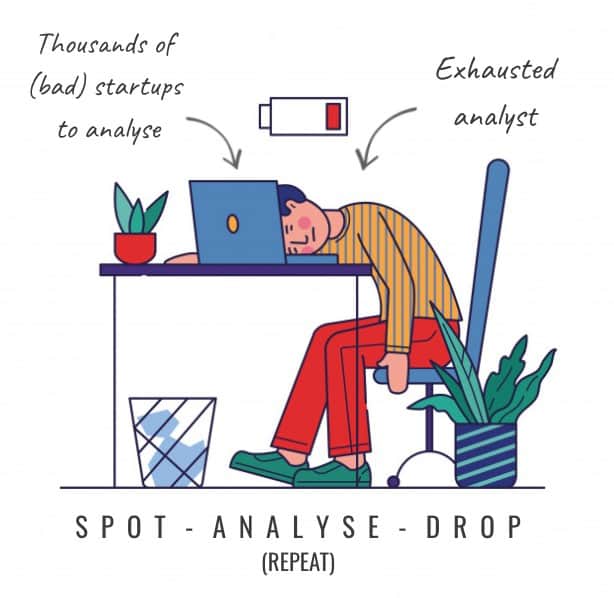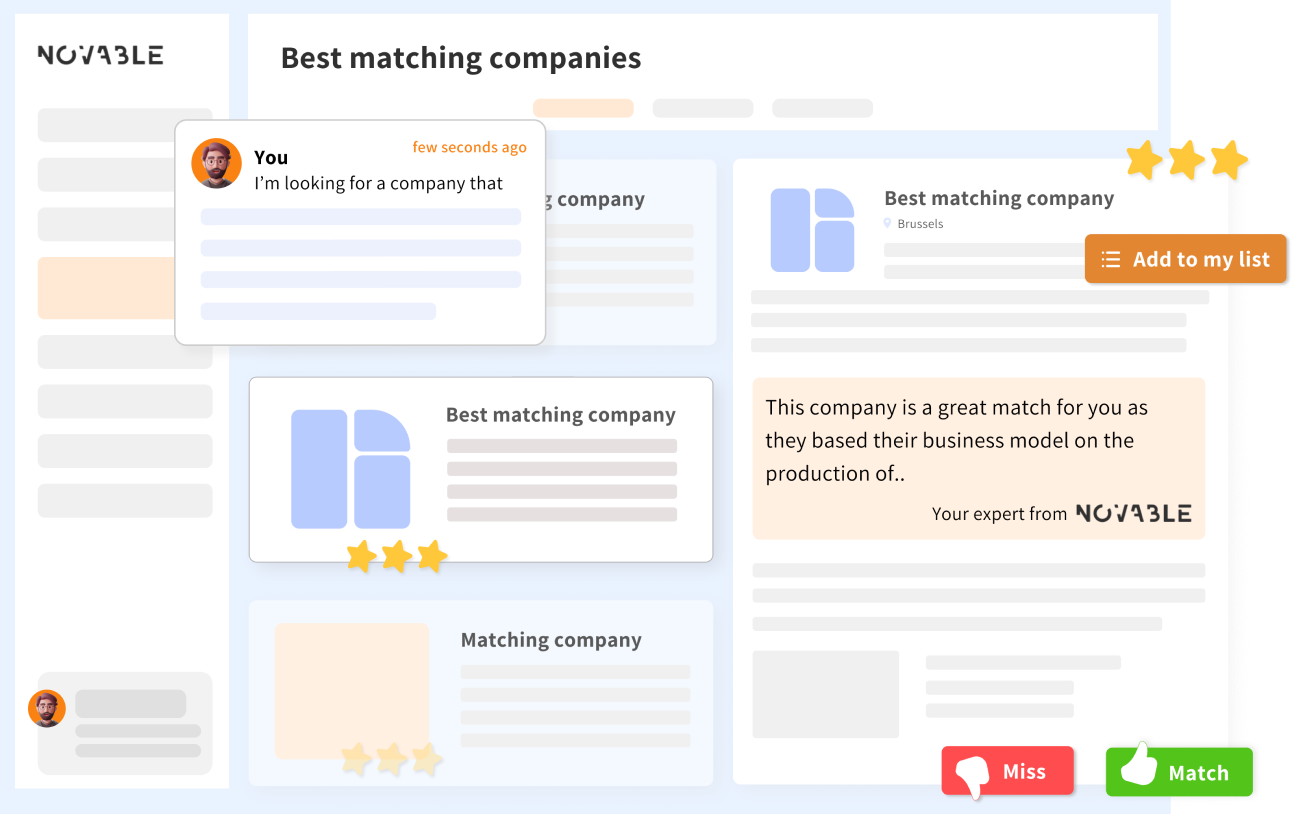It has become commonplace to say that artificial intelligence is moving into all areas of human activity. Yet, there is one area where this siege is still in its infancy: Corporate Venturing. The benefits of startup scouting are however undeniable. Let’s go through them quickly.
Let’s set the scene first. Corporate venturing is not new — dates back to the eighties. In recent years, the topic has been gaining ground within large companies and corporations, as evidenced by the many initiatives flourishing in many groups (CVC funds, corporate incubators, hackathons, innovation labs, etc.). This shows that external innovation is not an option anymore but a business imperative and a matter of survival. Today’s world needs innovation, especially in these troubled times. The world needs positive innovation and speed, and frictionless innovation flows create better opportunities at scale, not only for the sake of companies, but for the whole society.
Innovation-at-scale almost always passes through corporate innovation. Small, agile organisations are required to spark new ideas and technologies, while industrial power is required to industrialise them. We need the best of those two worlds brought together, so that tech innovation can contribute to solving major societal issues and world problems, provided that enough industrial power is injected into the process. Innovation and industry powers must connect seamlessly and globally, to speed up the world’s transformation.
The fact is that innovation hides everywhere, not only in high-visibility startups and hot ecosystems. The challenge is therefore to make innovation more visible and… more innovative, by connecting external innovation to industrial strategies. It is to reach all innovation sources and connect them with those who need them, to reach unchartered territories where innovation goldmines are not drilled yet, to make innovation flows more fluid, and contribute to a frictionless value chain.
It’s a challenge indeed. Having an eye on everything relevant is an impossible task, even for a senior expert in the field. The human brain thinks in categories, and even when you make the effort to think out of the box, your mental perimeter is limited by your professional, social and structural preconceptions. So you’re unconsciously limiting your potential reach. Let’s call this the innovation untapped serendipity (or IUS, if you like acronyms).
On top of the IUS phenomenon, there are also too many startups popping up out there to identify them all properly. Not all are innovative bodies, but you still have a new business opening every 3 seconds on the planet. Huge efforts are made by databases to collect firmographic data about any business worldwide, in which you can search using keywords or segmentation filters. The result is thousands of results thrown in your face — for you to review each line one by one to find your golden nugget — spot, analyse, drop (or SAD, if you like acronyms — read more about the SAD syndrome here).

Besides, using keywords in a database to explore innovation sources is somewhat counter-intuitive, as innovation involves the convergence of multiple dimensions, covering various fields and conditioned by new links creatively forged between distant topics — no keyword can help with that. Ontologically, a keyword precisely reduces a given concept to a single word. Using a keyword is to prune reality of its complexity.
The added value of AI solves all of the above — and more. Today, computers can take over most of our back-breaking work. Not just to save us from thankless tasks, but to bring us real benefits that could never have been conceived without high computing power and advances in data science. Let’s have a quick look at the added value a computer brings to the innovation and startup scouting table.
Startup scouting. Startup scouting. Startup scouting engine. Startup scouting engine.
Problem tackled
Analysts spend their time reading company sheets, websites and other information about startups they will never engage with. The 99% ratio is a well-known metric to VCs: 1% of startups they meet will be invested eventually. No reason it would be different for corporate venturing. Reading useless content is sad indeed.
Benefit
The computer is able to read millions of text pages almost instantly, to understand topics in the text, and to process multiple semantic analyses. Natural Language Processing (NLP) is one of your most precious companion in your startup scouting activities. Using NLP, you can delegate the reading to the computer — it will never blame you for killing it on the job.
Problem tackled
Gating startups takes time. Analysts must absorb a minimum amount of information about the startup before reaching a disqualification point. The decision to rule out a candidate is based on the distance between the venturing thesis and the startup’s profile (a profile covers more than mere firmographics and financials, it also includes activity, technology, models, people and all contextual data).
Benefit
Artificial intelligence, when properly designed and trained, is able to instantly calculate the semantic distance between the two matching ends: the company’s innovation strategy on the one side, and the startup context on the other side. This includes the capacity for the computer to process and understand complex, elaborated inputs that go far beyond keywords. As said earlier, innovation is a multidimensional matter.
Problem tackled
The more data you have, the better your decisions will be. Common sense. Adding data means reducing uncertainty proportionally. This is why analysts are keen on contextual information flows like social media, news feed and other weak signals. Problem is that all those sources are not automatically embraced in a single interpretation process. Adding context is often manual, and the value drawn from it is left to the human brain.
Benefit
Data is the raw material of AI. The computer makes links automatically between data sources. When we feed it with contextual data about startups, it will add it to the perimeter of its semantic understanding. The semantic distance between a startup context and a given briefing is calculated using all data we have, and including social media, news, patents, articles, people, etc., will further improve the matching accuracy.
Problem tackled
As mentioned above, a keyword is, by nature, a reduction of reality, a gross simplification, a wide angle, a photo overview with macro lenses. Using keywords for a thorough, accurate search will always result in shambolic results — even on Google.
Benefit
Since AI goes beyond keywords and calculates a matching score, result lists suddenly become ranked lists, so that analysts will first review the startups that best fit the unique strategy given as the campaign input. The ranking is not based on a number of occurrences or a popularity score whatsoever: it’s the real result of a semantic distance that goes down to the thinnest granular details. We call this ranked list a Golden Basket.

As an innovation-related or corporate development professional, you have the final cut. Efficiency is in the computer, but intelligence is in you. However, computers can be trained and algorithms improved. Tagging their delivery will teach them how to increase the matching rate next time. Machine learning at its best.
Bringing Artificial Intelligence in innovation and startup scouting is like having a consultant in a machine, or an Artificial Consultant that combines the best of both indeed: